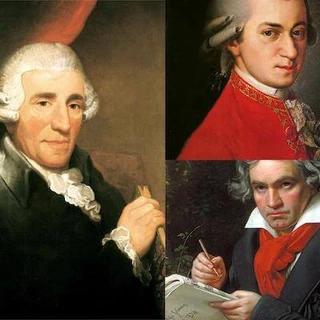Haydn, Mozart, and Beethoven

This project investigates the relations between musical structures of the String Quartets by Haydn, Mozart, and Beethoven using quantitative computer-aided analysis.
Abstract
According to Anja Volk et al., the investigation of musicological questions based on computational approaches generates new perspectives on old problems and the formulation of new questions in the context of the musicological research. Studies of this nature, for example, have already proven the melodic arc form in European folk songs, have revealed the presence of voice crosses in most of J. S. Bach’s chorales, and have resulted in automatic style classification algorithms. The work of J. Haydn, W. A. Mozart, and L. v. Beethoven — especially string quartets — is unquestionably important and an exciting corpus for exploratory studies. Questions such as “Do the string quartets written by Mozart in honor of Haydn have greater harmonic complexity than the others?” can be formulated and verified based on quantitative methods. Therefore, this project investigates the relationships between musical structures, such as phrase melodies and themes of these quartets. The bases of this project are computer-assisted quantitative methods and the digital scores repository of CCARH (Stanford University). We hope this study can broaden the knowledge about this repertoire, allow us to define and test hypotheses about it, and can be used directly in the undergraduate teaching of the UFBA School of Music.
Project structure
This project comprises five pillars:
- Music Theories. Contour, Rhythmic Partitioning, and Melodic Accent.
- Computational Tools for Music Analysis and Composition. Processing of symbolic data (MusicXML and Kern). Python and Javascript computer languages.
- Music Analysis. Manual and computer-assisted analysis of musical aspects related to the mentioned theories
- String Quartet repertoire. Haydn, Mozart, and Beethoven.
- Music Composition. Creation of compositional experiments related to the previous items.
Support
FAPESB, UFBA, and CNPQ support this project since 2019.
Completed Actions
- Modeling and implementation of data analysis system (versions 1.0, 1.1, 1.2 and 1.3)
- Analysis of Haydn’s string quartets, Op. 17 — Pitch registers
- Analysis of Haydn’s string quartets, Op. 50 — Form, texture, and contour (PIBIC-UFBA, PPGMUS-UFBA, MUSE29, MUSF18)
- Analysis of Haydn’s string quartets, Op. 33 (PIBIC-UFBA / PPGMUS-UFBA / MUSE29)
- Analysis of Haydn’s string quartets, Op. 33 — Form (PIBIC-UFBA)
- Literature review of Rhythmic Partitioning (by Sidnei)
- Literature review of Compositional Systems (by Sidnei)
- Modeling and implementation of RP Scripts (version 1.0)
- Modeling and implementation of RP Scripts (version 1.1)
- Modeling and implementation of RP Scripts (version 2.0)
- Modeling and implementation of RP Scripts (version 2.1)
- Modeling and implementation of RP Scripts (version 2.2)
- Modeling and implementation of RP Scripts (version 2.3)
- Documentation of RP Scripts (version 2.0)
- Documentation of RP Scripts (version 2.1)
- Documentation of RP Scripts (version 2.2)
- Documentation of RP Scripts (version 2.3)
- Modeling and implementation of web Zarlino (version 1.0)
- Modeling and implementation of web Zarlino (version 1.1)
- Modeling and implementation of web Zarlino (version 1.2)
- Modeling and implementation of web Zarlino (version 1.3)
- Modeling and implementation of web Zarlino (version 1.4)
Actions in Progress
- Literature review of Computational Musicology
- Literature review of the Haydn string quartets
- Modeling and implementation of web Zarlino
- Modeling and implementation of RP Scripts
- Elaboration of the Haydn string quartets annotated corpus (PIBIC-UFBA)
- Analysis of Villa-Lobos’ string quartets - texture and contour (by Sidnei)
- Analysis of the texture of the Beethoven’s symphonies (PIBIC-UFBA)
Softwares
Related Courses
- Seminar and Music Composition I (PPGMUS-UFBA)
- Seminar and Music Composition II (PPGMUS-UFBA)
- Topics in Music Composition (PPGMUS-UFBA)
- Topics in Music Theory and Analysis (PPGMUS-UFBA)
- Advanced Music Analysis I (EMUS-UFBA)
- Musical Literature and Structure III - Small forms (EMUS-UFBA)
- Musical Literature and Structure IV - Sonata Form (EMUS-UFBA)
Past advising
- Sidnei Marques de Oliveira. Masters. 2022–2024.
- Renato Alves Filho. Scientific initiation. 2024–2025.
- Dr. Ricardo Mazzini Bordini. Pos-doctorate. 2022–2024.
- Vicente Sanches de Oliveira. Scientific initiation. 2019–2024.
- Jaderson Cardona de Oliveira. Scientific initiation. 2020–2023.
- Matheus Travassos. Scientific initiation. 2019–2020.
- Carla Castro. Scientific initiation. 2019–2020.
Collaborators
- Dr. Pauxy Gentil-Nunes, UFRJ (2022-)
- Me. Sidnei Marques de Oliveira (Doctorate student, 2022-)
- Vicente Sanches de Oliveira (Volunteer, Scientific initiation, 2019-)
- Renato Alves da Silva Filho (Volunteer, Scientific initiation, 2023-)
- Daniel Lopes (Volunteer, 2024-)
- Dr. Ricardo Mazzini Bordini, UFMA (Pos-doctorate, 2023–2024)
- Jaderson Cardona de Oliveira (Scientific initiation, 2020–2023)
- Daniel Oliveira (Volunteer, 2022–2022)
- Kevin Macedo (Volunteer, 2022–2022)
- Carla Castro (Scientific initiation, 2019–2020)
- Matheus Travassos (Scientific initiation, 2019–2020)
- André Matera (Volunteer, 2019–2019)
Links
